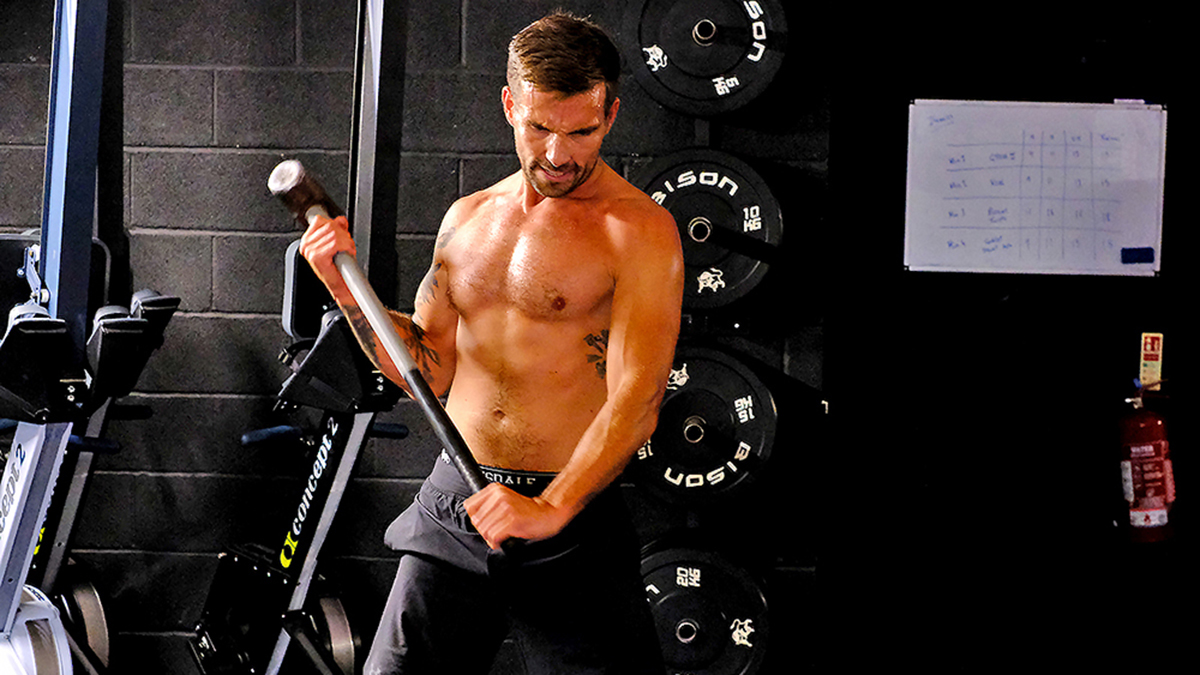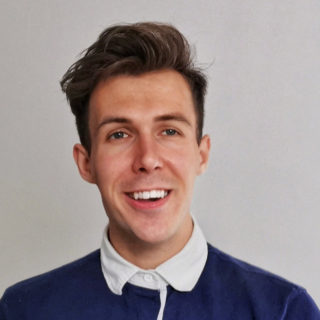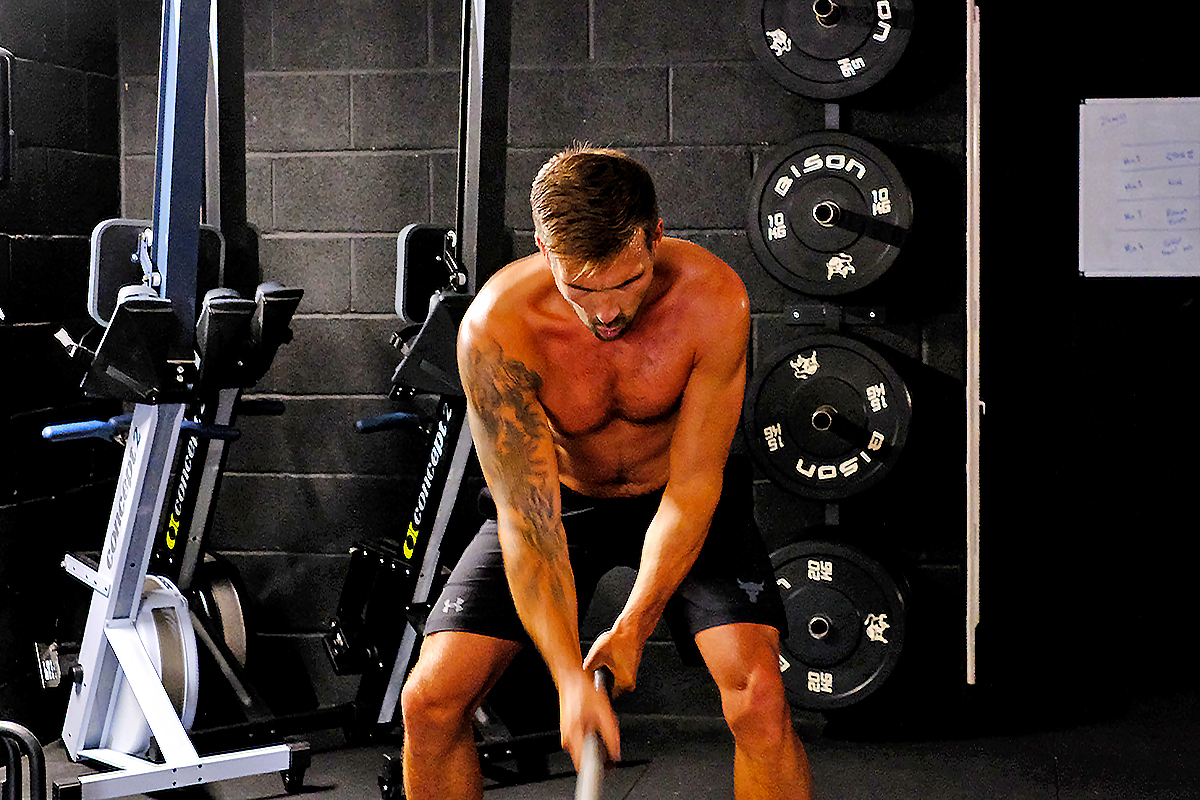Workout With Form | Michael Maisey

Michael Maisey is picking me up from his local train station in Taunton, where he relocated some 18 months ago with his wife and two daughters. Bar a familial link on his partner’s side, above all else, he was keen to provide his children with the opportunities he found lacking in his own West London upbringing.
“I wanted to give these girls a better life than I’ve had,” he’d go on to tell me, checking boxes such as schools, crime and other quality of life markers. But a life better than his own goes deeper than simply geography. Maisey’s childhood was tough, to say the least.
The son of addict parents, he spent the first years of his life on the run from his father. Abused by his uncle and bullied at school, he sought safety with a West London gang aged 12, and shoplifting soon became armed robbery. When he was 16 he served his first of three stints in Feltham Young Offenders Institute, a period in which drink and drug dependencies would take over and eventually lead to the failed suicide attempt which began his redemption arc.
When he pulls up in a swish black Land Rover, he’s wrapping up a phone call. I’ve overheard this very same conversation countless times in the last couple of months, the subject being James Cameron’s plant-based performance documentary The Game Changers. Not surprisingly, its influence hasn’t gone unnoticed in the southwest as he and his friend share anecdotes of how much better they feel having reduced their meat and dairy consumption. “I bet you’re farting like a champion,” Maisey jokes on hearing his friend currently has “chickpeas coming out of his ears.”
Incidentally, flatulence is one of the first things we get to chatting about once his phone call is finished – thankfully not due to any awkward stench filling the vehicle. Maisey tells me that he’s long struggled to find a protein supplement which 1/ doesn’t make him feel sluggish afterwards and 2/ doesn’t give him the farts. “My wife and I moved onto this vegan brand which had an offer on. We bought loads, but it just didn’t agree with us,” he recounts. “When we googled the ingredients on the back we discovered a lot of it people struggle to break down efficiently – there were whole forums dedicated to these particular ingredients and terrible farts.”
When he picked up a sample sachet of Form Performance Protein at an event, low-and-behold, it seemed to agree with him. Weeks later, his scented candle bill had begun to drop. “It’s just a great thing to have in the kitchen to go to mid-morning if I get hungry after training,” he gushes. “I mix it with half water, half coconut milk, and I’m good until lunchtime.”
“When I got sober, I had to learn how to live my life without the use of drugs and alcohol to take the edge off. Exercise was key to finding happiness without these things”
Right now, training is largely comprised of several sessions a week at the gym we’re en route to. He’s been recovering from a knee injury, which a marathon, obstacle course races and extensive training for Channel 4’s SAS: Who Dares Wins are all in part to blame. Now that he’s more or less back in fighting shape, Maisey promises our workout today won’t take any prisoners. Exercise has served as a displacement for alcohol and drugs since rehabilitating, and he tells me it’s only becoming more intense with every year of sobriety. Next month marks 12 years.
Feeding the Beast
We arrive at Spartan Chamber – a functional training gym sitting within an industrial estate in Chelston – and are greeted by its owner, former Royal Marines commando Ryan Atkins. On a whiteboard inside the two-story facility he’s devised a short circuit which we’ll complete three times, comprised of weighted sled pushes and farmers walks, tyre sledgehammers and time on the ski erg, watt bike and battle ropes.
Maisey is in good shape. He recently graced Richmond Magazine’s cover topless, a town he was known to get up to a lot of mischief in his youth. But he’s quick to assure me that his physique is far from the reason he keeps coming back to where we are today.
“It’s all in the endorphin hit,” he says. “When I got sober, I had to learn how to live my life without the use of drugs and alcohol to take the edge off. Exercise was key to finding happiness without these things.”
We do our first circuit at a leisurely pace, walking the sled from one side of the room to another. Maisey continues: “I used to be able to go to the gym and get that endorphin hit with a few squats and bench presses. But sooner or later it stopped working for me.”

The further he moved into sobriety, the more intense his activity became. He moved from 10ks to half marathons to marathons, but the endorphin rush of running alone soon mellowed, too. Military fitness in the lead up to SAS came next, and ultimately led him on the hunt to “get beasted” – seeking workouts that take him to the very edge of his mental and physical capacity.
“The goal has never been a six-pack,” he assures me as he lugs a sledgehammer overhead and slams it down on a tractor tyre. “I don’t believe that’s where happiness lies. I look for what effect it has on my mind.”
To this degree, Maisey’s training stretches far further than beast mode. He credits meditation, eating well, a daily gratitude list, Wim Hof breathing and cold water immersion as other activities that help him function. “You’d think it would become easier twelve years on. In reality, it takes more now. Your life gets bigger.”
We rest for a minute once we’ve put down the battle ropes and completed our first circuit. Atkins won’t allow the next two rounds to be quite so leisurely. Two minutes at every station, no rest. 20 minutes later, I am truly beasted.
Young Offender
“When I was younger, fitness for me was all about becoming the biggest, strongest, meanest motherfucker out there,” says Maisey once we’ve caught our breath enough to resume conversation. “It was about survival: ‘How do I make myself look like a tough guy so no-one will mess with me on the streets?’ I grew up on a rough council estate where people’s main source of income was from drugs. If people think ‘I can just go and rob Michael for his stuff,’ you’re a shit drug dealer. People need to fear you.”
It’s why, he tells me, in those circles, going to prison is glamorised. “You earn your stripes, which sounds crazy, but it’s how you and the people around you see it.” Sadly for Maisey, the model passed down to him from the men in his life backed up this worldview, his father a heroin addict who fled when he was young and his uncle a source of both physical and sexual abuse. “What I learned from men was to be violent, angry and irresponsible.”
Sitting on a sofa in the upstairs weights room at Spartan Chamber, it’s difficult to imagine a hardened teenager worthy of three young offenders sentences. Aged 15, he was first convicted, serving his sentence at Feltham young offenders institution.
“A byproduct of doing the work on yourself is that material success comes. Don’t get me wrong, I worked hard, but it felt a lot like the universe was sending good things my way”
But it was arguably here where he began to see exercise as a route to self-betterment outside of a tough-guy persona, passing time in his cell with bodyweight workouts comprised of sit-ups, push-ups and dips from the bars on his cell. As for any institutional rehabilitation, in Maisey’s eyes, the extent was “essentially, not very much.”
Yet, on his third and final run-in with the law, he entered Feltham addicted to heroine and underwent a controversial detox program now banned in prisons. A few days in, he found himself hallucinating, wrapped his bedsheets around a ceiling fixture and attempted to hang himself.
An on-duty prison guard performing a random check that night found him, cut him down and resuscitated him. It was around this time Maisey also learned that his mother – who had been alcohol dependent his entire life – was now sober. The third time he left prison, he was determined to change course.
Inside Job
The beginning wasn’t easy. With no job or income, Maisey started out by educating himself on goal setting, the law of attraction and other such philosophies. But in the initial stages, any progress was stunted by the need to go out and binge drink. It wasn’t until he turned 25 when he vowed to cut out drugs and alcohol completely.
“It was a case of realising that my biggest competition was the man looking back at me in the mirror,” says Maisey. “The biggest downfall of the prison system is that our solution for young men is to give them a PT or chef qualification, or a maths GCSE, and think the work has been done. We fix the external perception without paying attention to the internal stuff. In reality, he’s now just an angry young man with a PT qualification – what’s going to happen when he goes back to his neighbourhood and someone calls him a pussy?”
A natural part of overcoming addiction – Maisey informs me once we’ve left the gym and make our way back to the train station – is restructuring. “For me, that meant seeing exactly how much I could change. I wanted to break the cycle of my family history and I didn’t want my kids to carry this shit into the world,” he says. “A byproduct of doing the work on yourself is that material success comes. Don’t get mhttps://formnutrition.com/us/wp-admin/upload.phpe wrong, I worked hard, but it felt a lot like the universe was sending good things my way.”
With this realisation, much of Maisey’s life now is devoted to helping others do the same. He travels the UK delivering motivational talks and visits schools and prisons to run workshops. In 2014, he was even awarded a Community Safety Hero award by the Metropolitan Police.
Now, from the land surrounding his home in Devon, he runs retreats for men. Why men exclusively? “Men sometimes need to heal their wounds with other men,” he tells me. “A lot of us have wounds around men, and for many of us, men have had negative roles in our lives. This is especially true at school, when you experience bullying from other men, and those early relationships with affect your judgements growing up. If you’re bullied by a good looking, muscley kid on the rugby team at school, every time you see a good-looking, muscly kid, you make a subconscious judgement about him.
“All the work I’ve done on myself leads me back to love,” he continues. “How much love can I now put back into the world. As men, we associate love with weakness, but the strongest men I’ve met are the ones who are willing to open their hearts.”
Before I get out of the car, Maisey gifts me a signed copy of his memoir, Young Offender, released in July this year. Out kayaking on the river Thames one morning, it was his actor friend Tom Hardy who encouraged Maisey to put pen to paper. “I remember being really confused when he suggested it,” Maisey recounts. “He said I think you should, even if it helps just one person.”
And the message, he tells me, is this: “You can go through anything and still turn it around. Rehabilitation is possible for anyone if that person is willing to do the work, and when you can do that deep work, naturally, your life will improve.”




















